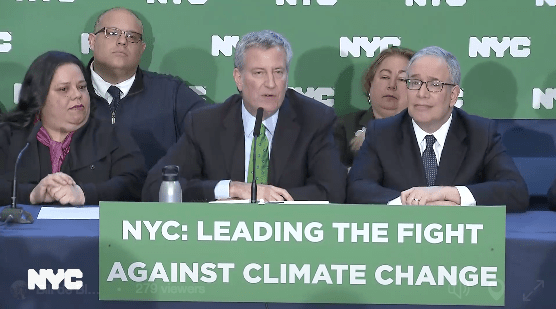Well this is rich.
Mayor de Blasio -- who opposes congestion pricing, treats parking placards as political currency, and has declared war on electric bikes -- is taking Big Oil to court over climate change.
Today de Blasio announced that NYC will sue the country’s five biggest oil producers “alleging climate change and global warming led to Hurricane Sandy and its catastrophic fallout,” Politico reports. The suit will seek “reparations” and attempt to force the companies to pay for city resiliency projects.
De Blasio also called for city pension funds to divest from oil companies.
It's well established that de Blasio fancies himself a climate change leader. But publicity stunts like today's, designed to burnish his bona fides for a perceived national audience, are completely out of sync with the mayor's own transportation policies.
.@NYCMayor does this even as he “does not believe” congestion pricing for car access to Manhattan is a good idea? https://t.co/JmaFPir1rf (because he says it hurts outer borough middle class) See @streetsblog rebuttal https://t.co/5rgAKnKrbq pic.twitter.com/JLvysuxgnu
— Andy Revkin (@Revkin) January 10, 2018
De Blasio has tied himself in knots to justify his opposition to road pricing, which would get cars off city streets, fund transit improvements, and generally help shift the nation's largest city to low-carbon transportation. Instead, his big plan to bust Midtown gridlock is a rehash of failed half-measures that would do nothing to discourage driving into the Manhattan core.
He thinks delivery workers should trade their electric bikes for automobiles, threatening non-compliers with fines, property seizure, loss of livelihood, and possible deportation.
To the delight of the teachers union, de Blasio handed out tens of thousands of parking placards in an election year, creating yet more inducements to drive instead of taking transit. City Hall has declined to release records related to how and why the placard deal came about.
De Blasio's grandstanding today is sure to make headlines. But his posture as a bold leader on climate has little in common with his timid policy record.






